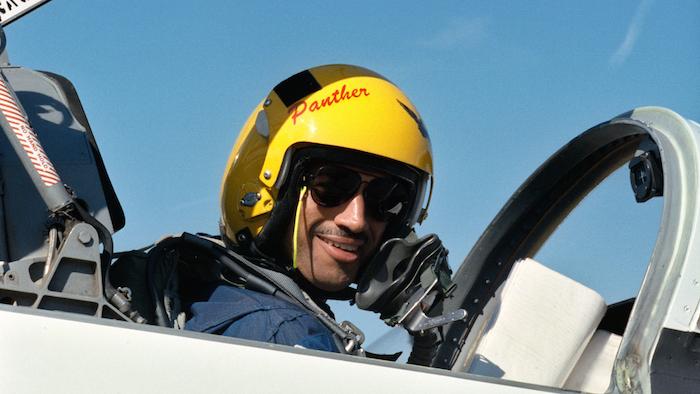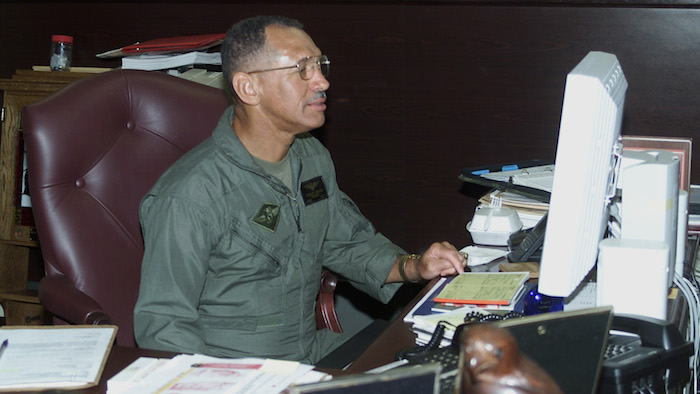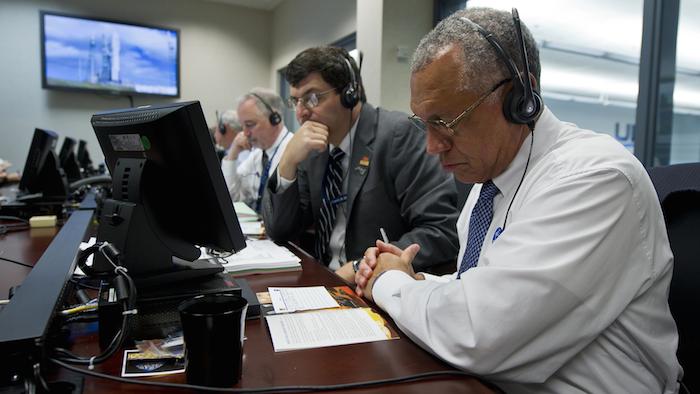.

Former Marine astronaut leading flight plans for NASA’s mission
Charles “Charlie” Bolden, the 12th Administrator of the National Aeronautics and Space Administration talks during a meeting at an unknown location and date. Bolden served 34 years on active duty in the Marines as a Naval aviator, spent 14 years as a member of NASA’s Astronaut Office and retired at the rank of major general.
Image
.

WASHINGTON -- Though a great and many challenges tried his determination, Charles “Charlie” Bolden, the 12th and current Administrator of NASA, rose among the few and proud to become one of the most successful Marines in modern history.
Since seventh grade, Bolden aspired to attend the U.S. Naval Academy.
“I saw a program on television called ‘Men of Annapolis’ in seventh grade and I fell in love with the uniform watching the movie,” said Bolden. “After watching the movie, I decided I wanted to go to the U.S. Naval Academy.”
Bolden grew up in Columbia, South Carolina, knowing very little about the Marine Corps or the military despite his father and uncles serving in the U.S. Army during World War II. Bolden would routinely see Marines from Parris Island, South Carolina in his hometown.
“The Marines were crazy, really rambunctious in the city park,” said Bolden. “I decided there was one thing I would never do and that was be a Marine.”
After being accepted to the U.S. Naval Academy and starting school, Bolden believed he made a mistake. The surrounding community of Annapolis, Maryland was still segregated at the time and the academy had very few black people and no women.
“There were a lot of reasons to be very uncomfortable,” said Bolden. “I called my mom and dad every weekend and said, ‘I made a mistake and I want to come home.’ My dad would tell me to stay one more week, and he did that for 52 weeks.”
Bolden persevered through his first year, which seemed like a long boot camp to him. His parents taught him that anything was possible if he just set his mind to it.
“I think the thing that saved me were two Midshipmen who were juniors in my company,” said Bolden. “They paid me a visit one day and said, ‘You know you’re not going to graduate.’ I asked, ‘What makes you think that?’ They said, ‘We are going to make it so hard on you and run you out.’ I said ‘Okay, good luck with that.’
“Right at that moment I determined, ‘I don’t give a crap what this place is like. I’m not going home.’ Who knows what would have happened if that particular incident had not come up.”
During his four years at the Naval Academy, Bolden evaluated what service he wanted to join upon graduating. He remembered his company officer during his first year at the academy, who was a Marine.
“He was an infantry officer, a Vietnam veteran and had impressed me,” said Bolden. “He was like my dad, firm but fair. I decided I wanted to be like him.”
Bolden graduated the Academy in 1968 with a degree in electrical science and was commissioned as a Marine Corps 2nd lieutenant. Three days after graduating, Bolden married his wife, Alexis “Jackie” Walker, whom he had grown up with in South Carolina since they were three years old.
“She was at my graduation and commissioning,” said Bolden. “When we got married we made several promises to each other. We agreed we would stay around [in the Marine Corps] as long as we were having fun.”
Bolden attended The Basic School at Marine Corps Base Quantico, Virginia, in November with the goal of serving his five-year commitment to the Marines then go back to school to earn a master’s degree in electrical science.
“About half way through The Basic School, I started having second thoughts about being an infantry officer,” said Bolden. “It was freezing cold with snow and ice on the ground. I volunteered for every fire watch during our three-day war, so I wouldn’t have to sleep. I was convinced if I fell asleep laid out on the ground I would die. Iit was so cold.”
After graduating The Basic School, Bolden told his wife he would like to do something else instead of being an infantry officer.
“My wife said, ‘Why don’t we go to Pensacola [and become a pilot],’’’ said Bolden. “I had told myself coming out of high school was that I would never fly air planes because that was inherently dangerous, but as usual my wife was right.
“I had an aviation option out of the academy, so I went to Pensacola. The very first time I got in an airplane and lifted off I fell in love with it.”
One of Bolden’s instructors at flight school was a Marine test pilot. After talking often about the job and duties of a test pilot and earning his Naval Aviator Insignia in 1970, Bolden started to apply for test pilot school. Bolden applied over and over for test pilot school while he and Jackie started a family.
“Our son was born when we were at my first duty station at Marine Corps Air Station Cherry Point, North Carolina and right after his first birthday I went to Vietnam and lived in Thailand for a year,” said Bolden. “Back then we communicated by letter. There weren’t many phone calls. There were weeks between communication, but I was able to get my wife and son moved to [South Carolina] so my parents and her mom were able to look after them.”
While in Thailand, Bolden flew more than 100 combat missions in Vietnam, Cambodia and Laos. After his tour, Bolden returned to the U.S. and moved his family near Los Angeles where he worked on recruiting duty.
“There were lots of activities and things to do in the area, it was a great environment for our son,” said Bolden. “Our daughter was born and after about six years I was accepted to the Navy’s test pilot school. We picked up the family and moved to Patuxent River, Maryland.”
Bolden completed his test pilot training in 1979 and applied for the space program.
“When I finally decided to apply for the space program, something else I never dreamed of, I was selected,” said Bolden.
Bolden spent 14 years in Houston, Texas as a NASA astronaut. He flew on the space shuttle four times and served as a commander for two missions and a pilot for two missions.
“Every time I flew there was no question that I was a Marine,” said Bolden. “Traditionally astronauts wear a blue and gold name tape. We insisted on a scarlet and gold name tape, a Marine Corps name tape, that we wore with our Naval Aviator Insignia of gold. That started a fad, and the Army and Air Force guys wanted name tapes for their service.
“We felt it was very important to emphasize the service that we represented. Anytime I went anywhere if it was possible I would wear my uniform so people would know that I was a Marine, and the Marine Corps was making a contribution to the space program.”
While in Houston, Bolden worked at the Johnson Space Center, which provided a lot of stability for his family. After completing his service with NASA, Bolden returned to the Naval Academy where he served as the Deputy Commandant of Midshipmen, then in 1997 served as the deputy commanding general of I Marine Expeditionary Force. During this time, Bolden also served as the commanding general of I MEF Forward in support of Operation Desert Thunder in Kuwait in 1998.
After being promoted to his final rank of major general later in 1998, Bolden assumed duties as the deputy commander of U.S. Forces Japan. He continued his career at 3rd Marine Aircraft Wing Miramar, California.
“Among my proudest accomplishments was serving successfully as the commanding general of 3rd Marine Aircraft Wing in Miramar, California, and putting a program into place called Putting Marines First,” said Bolden. “The program really focused on making sure our Marines knew we cared about them and were fit physically, mentally and spiritually. The Marines were the most important assets that we had.”
Bolden relied heavily on the chaplain and medical officer of the aircraft wing to ensure the success of the program. Then he challenged the officers and staff noncommissioned officers of the wing to ensure they embraced the program and facilitate the success of Marines of all ranks.
“I think that program was my proudest accomplishment in my 34 years in the Marine Corps,” said Bolden.
Reflecting on his Marine career, Bolden said there was never a single incident he experienced due to race while he was in uniform.
“I didn’t experience any overt racism when I was in uniform,” said Bolden. “When I went out in the community that was a different thing because then nobody knew who you were. The Marine Corps has done a pretty good job over time, we have always focused on diversity and inclusion.”
.

Quelle: MARINES
5038 Views
